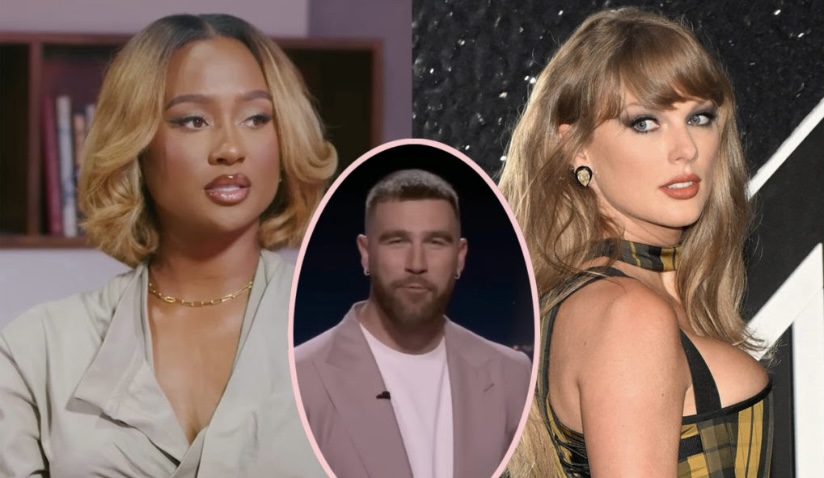NFL
BREAKING: Kayla Nicole, Former Girlfriend of Travis Kelce, Reveals She Continues to Endure Harsh Criticism from Taylor Swift Fans, Prompting a Heated Response from Swifties

Travis Kelce’s Ex Says She’s STILL Getting Hate From Taylor Swift Fans! And Swifties React!
In the midst of a media whirlwind surrounding Travis Kelce’s high-profile romance with Taylor Swift, Kayla Nicole, Kelce’s former girlfriend, has stepped into the spotlight once again. The ex, who dated Kelce prior to his relationship with the pop superstar, claims she is still facing relentless online hate from Taylor Swift fans. As heated debates and passionate defenses echo across social media platforms, the issue is stirring up controversy among Swifties and casual observers alike.
A Personal Battle in the Public Eye
Kayla Nicole, known for her past relationship with the NFL star, recently opened up about the personal toll of the sustained online harassment. Despite having moved on from her relationship with Kelce, Nicole says that the backlash—predominantly from fervent Taylor Swift fans—has persisted long after their breakup. In her candid remarks, she described the experience as “exhausting” and expressed her disbelief that she continues to be targeted by people who claim to support one of the world’s most beloved pop icons.
Her statements highlight a broader issue that often plagues public figures and individuals associated with them: the unintended consequences of celebrity relationships. For Nicole, the transformation of Kelce’s personal life into a public spectacle has resulted in an unyielding stream of negativity that she says is both invasive and demoralizing.
The Swifties’ Response: A Divided Front
As news of Nicole’s experience spread online, it sparked a polarized reaction among Taylor Swift’s dedicated fan base, commonly known as Swifties. On one hand, some fans have staunchly defended the singer, arguing that any criticism or association with her should be met with fierce loyalty and protective measures. These supporters believe that criticism directed at anyone connected to Swift, including former partners of her current flame, is a misdirected expression of their passion for the star.
On the other hand, a significant number of Swifties have voiced concerns over the ethics of harassing someone who is no longer in the limelight of a relationship with Kelce. Critics of the ongoing hate campaign argue that targeting Kayla Nicole is not only unfair but also an overreach that undermines the principles of respectful online discourse. They contend that everyone, regardless of past associations with a celebrity, deserves to be treated with dignity.
Examining the Dynamics of Online Harassment
The situation surrounding Kayla Nicole’s ongoing experience is a stark reminder of how personal lives can be caught in the crossfire of celebrity fandom. The digital age has amplified the reach and impact of social media, where the line between passionate support and unwarranted harassment is often blurred. For many, the actions of a subset of Swifties have highlighted the darker side of fan culture—one where loyalty can sometimes lead to hostility against individuals who once played a role in a celebrity’s personal history.
Experts on online behavior suggest that this trend is part of a larger cultural phenomenon where public figures and their acquaintances are scrutinized and judged based on affiliations and past relationships. While fandom can be a powerful community force, it also comes with the responsibility to ensure that support does not morph into harmful behavior.
What’s Next in an Ever-Evolving Story?
As the debate intensifies, both sides of the conversation seem unlikely to reconcile their differences anytime soon. Kayla Nicole’s continued struggle against online hate serves as a poignant example of the collateral damage that can arise from high-profile relationships. It also prompts a broader reflection on the need for empathy and understanding in digital interactions, especially when personal histories are involved.
For now, Kayla Nicole’s story remains a focal point in discussions about the responsibilities of celebrity fans, and Taylor Swift’s legion of supporters, known for their fervor, face a moment of introspection. Whether this controversy will prompt a shift toward more respectful online discourse or deepen the existing divides among fan communities is a question that only time will answer.
In the meantime, the unfolding narrative serves as a cautionary tale about the power of digital platforms—and the importance of balancing passion with respect for individual privacy and dignity.












